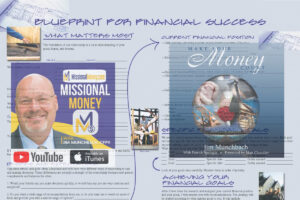How to Manage Market Risk
Do you get just a little anxious when the stock market crashes? We can help take the guesswork out of your investments.
In this episode, I want to share a few thoughts about how to manage the risk in your investment portfolio. Honestly, on days like today, its really more about managing your own emotions. Taking a deep breathe and being confident that your long-term plan is working just the way its supposed to work.
Today the Dow was basically in freefall, down nearly 1,600 points lower than Friday.
Markets Go Up and Down
This kind of correction happens periodically and it freaks people out a bit. Financial gurus can spin any tail they want to explain what’s happening, but what I’m saying to my clients — and what I have been saying to clients is simple. The market goes up and the market goes down.
Lately, before today, you may have been feeling like the market only goes up — and its been going up fast and furious.
Today was generally something you could expect after the recent up swing but it still feels a little scary to most investors.
What about you?
When the stock market is as nerve-wracking as it was today, investors need to pause and make sure that any decisions you make are part of your overall plan.
You never want to make decisions as a result of panic.
I know, that’s easier said than done. Some investors are good at staying the course. They never worry about the market’s short-term volatility, but others need to do something to feel like they’re in control. That’s when most investors make big, costly mistakes.
If you’re really convinced that a massive bear market is about to begin, you’re probably already out of the market.
Most investors, typically, face lots of uncertainty. You may not know what to do after a day like today. That’s why I’m suggesting you may want to check your panic meter — before you make any big decisions.
Don’t Panic
Check your body for a few minutes to see if you notice any of the physical symptoms of a panic attack.
— Is your heart racing a bit?
— Having any sweats or chills?
— Are you feeling faint or dizzy?
— Do you have any sensations of impending doom or terror?
— Are you experiencing a sense of loss of control?
Your Financial Advisor Feels Your Pain
As an Investor, if you’re feeling any of those things when you think about your investment portfolio, you probably need to meet with your Financial Advisor to make sure your investments are in alignment with your risk tolerance.
You may feel panic because you’re not comfortable with where the market is headed and/or maybe you’re not comfortable living with the investment plan you have in place.
At this point, hanging on and hoping for the best — even if you have a viable wealth management strategy in place — may not feel realistic for you.
Before You Make Changes
There are lots of changes you could make, however, I’d suggest you start with a better understanding of the risk you have in your portfolio before you make any changes.
You may want to come up with a few defensive strategies in order to feel a little better about these big waves of market volatility.
Selling some of your investments is definitely an option, and even though the buy-and-hold community says it’s a massive mistake, if you’re a nervous investor, selling something may make you feel a little more in control.
Before you consider selling anything into this market, ask yourself a few basic questions:
- How will selling some of your stocks protect your nest egg??
- If you sell to protect gains (or because you expect an even bigger downturn in a specific security or market sector) you’re locking in profits — but you also need to consider how to put the money to work in an area with better opportunities.
- Do you want to change your asset allocation, or are you wanting to maintain the value of your portfolio?
I never recommend putting your money on the sidelines for the long haul. However, if you’re trying to protect your retirement savings because you’re afraid of another market meltdown, your money can stay on the sidelines a little longer, but you really want to redeploy your assets into an allocation mix that matches your long-term goals and/or is simply more consistent with your tolerance for risk.
Be wise, don’t be hasty.
Today’s market crash can be an important opportunity for the next steps in your wealth management strategies.
If you’re moving money because of an emotional response to the market’s volatility, carefully consider how your portfolio should be constructed or rebuilt moving forward. Pulling money out of the market because of fear is probably an impulsive move — and that’s one big mistake to avoid.
There may be some strategic reasons to sell some of your more risky investments, but if you’re selling out of fear, that’s letting Mr. Market dictate your strategy rather than having a strategy that positions you to confidently deal with market risk.
If you decide to go to fully into cash, you’ll have no stock-market risk, but you trade that risk for a 100% guarantee that your money won’t keep pace with inflation.
Balancing risk and reward is the best reason for good asset allocation; if you unload a portion of your portfolio, understand how that will change your asset allocation.
Never put all of your eggs in one basket, even if it feels like the smart move on a day like today.
The biggest problem when you’ll have if you panic and get out of the market is that you’ll have a tough time figuring out when to get back into the market.
Over the long haul, wise investors are always balancing risk and reward by protecting wealth while growing it. Achieving that balance with a little planning helps ensure that today’s anxiety doesn’t erode your family’s clarity, confidence, control, and contentment.
If you’re not feeling overly confident in your family’s financial plan, give me a call at 832-895-1700. I’d love to learn more about you, your family, and your goals.
Its a lot easier than you might think to create a solid plan that will give your family a lot more clarity, confidence, control — and contentment.
Thanks for listening to Family Wealth Builder — the weekly podcast about money, life, and relationships. And sometimes we talk about investment management, and financial planning, too.
Last week, I played an interview from our Radio Archive with my friend Patrick Springle. Keep listening as Pat and I shares more insights about training our kids to be wise money managers.
After the interview, I’ve included a short segment from The Blue Book for those of us who need a little more contemplation in our day.
Podcast: Play in new window | Download



